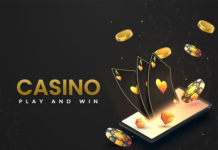
The integration of blockchain technology into the online gambling industry is revolutionizing the way players engage with slot games. Blockchain, the underlying technology behind cryptocurrencies like Bitcoin and Ethereum, offers numerous benefits such as transparency, security, and decentralization. In this article, we will explore how blockchain is transforming the slot industry, from enhancing security and fairness to enabling new payment methods and innovative game designs.
Enhanced Security and Fairness
One of the primary benefits of blockchain technology in the slot industry is enhanced security and fairness. Traditional online casinos rely on centralized servers to manage game outcomes and player funds, leaving them vulnerable to hacking and manipulation. In contrast, blockchain-based slot scatter games operate on decentralized networks, where transactions and game outcomes are recorded on a public ledger that cannot be altered or tampered with.
Provably Fair Gaming
Blockchain-based slot games often utilize a concept known as “provably fair gaming,” which allows players to verify the fairness of each game round independently. By providing access to the game’s algorithm and using cryptographic techniques to generate random outcomes, players can ensure that the game is fair and transparent, thereby building trust and confidence in the platform.
Seamless and Secure Payments
Blockchain technology also enables seamless and secure payments in the slot idn industry, eliminating the need for traditional banking methods and reducing transaction costs and processing times. Cryptocurrencies like Bitcoin, Ethereum, and Litecoin offer fast and borderless transactions, allowing players from around the world to deposit and withdraw funds quickly and conveniently.
Anonymity and Privacy
Blockchain-based slot games prioritize player anonymity and privacy, allowing users to gamble without revealing their personal information or banking details. Cryptocurrency transactions are pseudonymous, meaning that players can participate in gambling activities without leaving a digital trail that can be traced back to them, enhancing privacy and security.
Decentralized Game Development
Blockchain technology has also facilitated the emergence of decentralized game development platforms, where developers can create and deploy slot games without relying on centralized intermediaries or regulatory authorities. These platforms leverage smart contracts, self-executing code stored on the blockchain, to automate game mechanics such as payouts, wagering, and random number generation.
Tokenization of In-Game Assets
Some blockchain-based slot qq games incorporate the concept of “tokenization,” where in-game assets such as virtual items, characters, and currencies are represented as digital tokens on the blockchain. Players can buy, sell, and trade these tokens on decentralized exchanges, creating a vibrant economy within the game ecosystem and providing new opportunities for monetization and player engagement.
Regulatory Challenges and Compliance
While blockchain technology offers numerous benefits to the slot industry, it also presents regulatory challenges and compliance issues that must be addressed. Regulatory authorities around the world are still grappling with how to regulate blockchain-based gambling platforms, which operate outside the traditional regulatory framework.
Compliance with Anti-Money Laundering (AML) and Know Your Customer (KYC) Regulations
Blockchain-based slot games must comply with anti-money laundering (AML) and know your customer (KYC) regulations to prevent illicit activities such as money laundering and terrorist financing. Casinos may be required to implement robust AML and KYC procedures, including identity verification checks and transaction monitoring systems, to ensure compliance with regulatory requirements.
Future Outlook
As blockchain technology continues to mature and gain mainstream acceptance, its impact on the slot industry is expected to grow exponentially. We can anticipate further innovations in provably fair gaming, decentralized game development, and tokenization of in-game assets, leading to a more transparent, secure, and immersive gambling experience for players.
Integration with Virtual Reality (VR) and Augmented Reality (AR)
The integration of blockchain technology with virtual reality (VR) and augmented reality (AR) has the potential to revolutionize the slot industry, offering players immersive and interactive gaming experiences that blur the line between the virtual and physical worlds. Blockchain-based VR casinos could provide a decentralized and censorship-resistant alternative to traditional gambling platforms, offering unprecedented levels of privacy, security, and freedom to players.
Conclusion
Blockchain technology is transforming the slot industry by enhancing security and fairness, enabling seamless and secure payments, decentralizing game development, and addressing regulatory challenges. With its ability to provide provably fair gaming, facilitate anonymous transactions, and empower players with greater control over their funds and gaming experiences, blockchain is poised to revolutionize the way we play and interact with slot games in the digital age. As the technology continues to evolve and mature, we can expect to see further innovations that redefine the future of gambling on the blockchain.


























